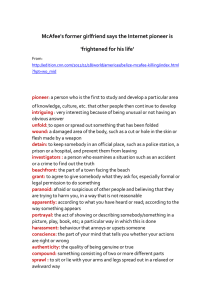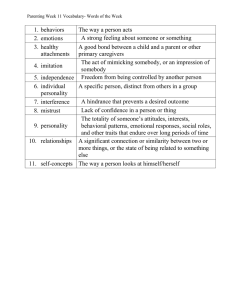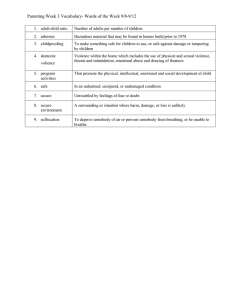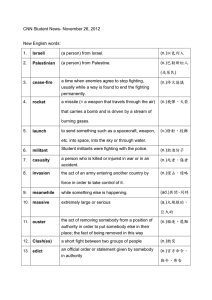Career Management 1.01 KEY TERMS Abilities: Achievement: effort
advertisement
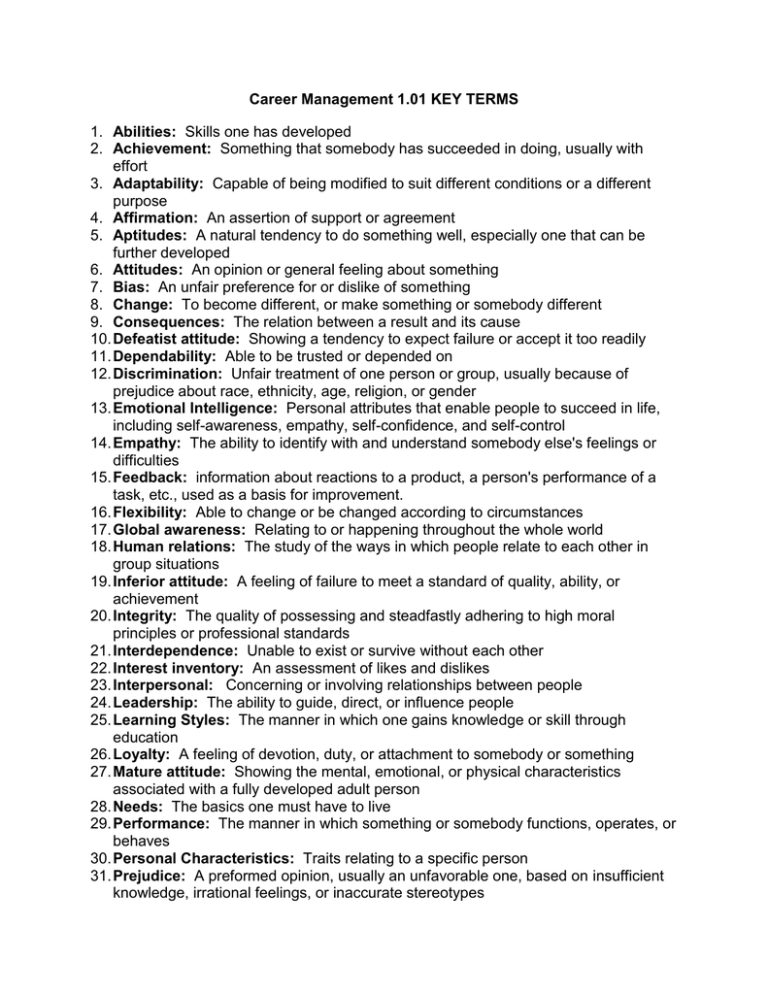
Career Management 1.01 KEY TERMS 1. Abilities: Skills one has developed 2. Achievement: Something that somebody has succeeded in doing, usually with effort 3. Adaptability: Capable of being modified to suit different conditions or a different purpose 4. Affirmation: An assertion of support or agreement 5. Aptitudes: A natural tendency to do something well, especially one that can be further developed 6. Attitudes: An opinion or general feeling about something 7. Bias: An unfair preference for or dislike of something 8. Change: To become different, or make something or somebody different 9. Consequences: The relation between a result and its cause 10. Defeatist attitude: Showing a tendency to expect failure or accept it too readily 11. Dependability: Able to be trusted or depended on 12. Discrimination: Unfair treatment of one person or group, usually because of prejudice about race, ethnicity, age, religion, or gender 13. Emotional Intelligence: Personal attributes that enable people to succeed in life, including self-awareness, empathy, self-confidence, and self-control 14. Empathy: The ability to identify with and understand somebody else's feelings or difficulties 15. Feedback: information about reactions to a product, a person's performance of a task, etc., used as a basis for improvement. 16. Flexibility: Able to change or be changed according to circumstances 17. Global awareness: Relating to or happening throughout the whole world 18. Human relations: The study of the ways in which people relate to each other in group situations 19. Inferior attitude: A feeling of failure to meet a standard of quality, ability, or achievement 20. Integrity: The quality of possessing and steadfastly adhering to high moral principles or professional standards 21. Interdependence: Unable to exist or survive without each other 22. Interest inventory: An assessment of likes and dislikes 23. Interpersonal: Concerning or involving relationships between people 24. Leadership: The ability to guide, direct, or influence people 25. Learning Styles: The manner in which one gains knowledge or skill through education 26. Loyalty: A feeling of devotion, duty, or attachment to somebody or something 27. Mature attitude: Showing the mental, emotional, or physical characteristics associated with a fully developed adult person 28. Needs: The basics one must have to live 29. Performance: The manner in which something or somebody functions, operates, or behaves 30. Personal Characteristics: Traits relating to a specific person 31. Prejudice: A preformed opinion, usually an unfavorable one, based on insufficient knowledge, irrational feelings, or inaccurate stereotypes 32. Punishment technique: A penalty that is imposed on somebody for wrongdoing 33. Respect: A feeling or attitude of admiration and deference toward somebody or something 34. Responsibility: The state, fact, or position of being accountable to somebody or for something 35. Reward technique: Something desirable given in return for what somebody has done 36. Self-concept: A complete and individual personality, especially one that somebody recognizes as his or her own and with which there is a sense of ease 37. Self-control: The ability to control your own behavior, especially in terms of reactions and impulses 38. Self-esteem: confidence in your own merit as an individual person 39. Self-observation: Awareness of one’s own personality, skills, and traits 40. Skills: The ability to do something well, usually gained through training or experience 41. Stereotype: An oversimplified standardized image of a person or group 42. Stimulus: Something that encourages an activity or a process to begin, increase, or develop 43. Strengths: A valuable or useful ability, asset, or quality 44. Superior attitude: A feeling of surpassing others in something such as intellect, achievement, or ability 45. Sympathy: The ability to enter into, understand, or share somebody else's feelings 46. Talents: Natural ability in particular activity. a natural ability for being good at a particular activity 47. Transferable skills: A skill that is not limited to a specific academic discipline, area of knowledge, job, or task and is useful in any work situation, e.g. communication or organizational skills 48. Values: The worth, importance, or usefulness of something to somebody 49. Visualization: To form a visual image of something in the mind


